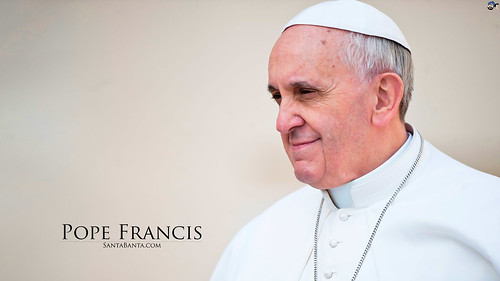Duluth, Minnesota (OpEdNews) October 6, 2023: Pope Francis' somewhat lengthy 2015 eco-encyclical letter Laudato Si' (words in the expression used by the medieval Italian mystic Saint Francis of Assisi [c.1181-1226] in his famous canticle that mean "Praise be to you, my Lord" -- according to Pope Francis [Paragraph 1]) was undoubtedly the most widely read encyclical letter ever issued by a pope. It contained 246 eloquent numbered paragraphs, followed by 172 numbered bibliographic endnotes for quotations in the text (but scripture quotations in the text were followed by conventional parenthetical documentation of the biblical sources).
As an encyclical letter issued by a pope, it was part of the official teaching magisterium of the Roman Catholic Church. As such, it was a landmark expansion of social teaching of the Roman Catholic Church. (It is available in English and other languages at the Vatican's website.)
On October 4, 2023, the feast day of Saint Francis of Assisi, Pope Francis (born in 1936 in Buenos Aires, Argentina; elected pope in 2013) issued his latest apostolic exhortation titled Laudate Deum ("Praise God"), addressed to all people of good will on the climate crisis. It contains 73 terse numbered paragraphs, followed by 44 numbered bibliographic endnotes - with scripture citations given in parentheses in the text. In the 44 numbered bibliographic endnotes, the most frequently quoted source in Pope Francis' 2015 eco-encyclical - thereby establishing the continuity of his new 2023 apostolic exhortation with it. (It is available in English and other languages at the Vatican's website.)
So 246 paragraphs in the pope's 2015 eco-encyclical versus 73 in his terse new 2023 apostolic exhortation on the climate crisis. The terse style of Pope Francis' new 2023 apostolic exhortation conveys his sense of urgency about the climate crisis.
I share his sense of urgency about the climate crisis. However, I do not seek to convey my sense of urgency about the climate crisis by writing the present essay in the terse style that Pope Francis deploys so effectively in his new 2023 apostolic exhortation.
I also recognize that many OEN readers are rightly concerned about certain other crises in American culture and politics today - including Trump and his most loyal followers. For most OEN readers, Pope Francis' new 2023 apostolic exhortation faces stiff competition for their attention - and so does my present essay.
Now, because Pope Francis is from Argentina, we may align him with the enormous part of the world known today as the Global South - the not very precise terminology that is used today to contrast with the supposed Global Noth (i.e., roughly equivalent to what is known as Western culture). This contrast of Global South and Global North appears to be used as an adversative contrast - calling to mind the Cold War (1946-1991) adversative economic contrast of capitalism versus communism.
But the emergence of economic globalization seems to refer to the globalization of capitalism. However, modern capitalism emerged historically in our Western cultural history after the Gutenberg printing press emerged in Europe in the mid-1450s.
For further discussion of the print culture that emerged historically in our Western cultural history after the Gutenberg printing press emerged in Europe in the mid-1450s, see my recent OEN article "Jeff Jarvis on the Age of Print and the Age of the Internet" (dated September 24, 2023):
In any event, the recent emergence of economic globalization has rendered the old adversative economic contrast of capitalism versus communism outdated. Therefore, to keep alive the spirit of an adversative contrast that lends itself to good-guy-versus-bad-guy thinking, we now use the terminology about the Global South versus the Global North.
Would we be bereft without some kind of ready-to-use good-guy-versus-bad-guy thinking? Without explicitly using good-gut-versus-bad-guy thinking, I have urged readers in the English-speaking world to get their cultural bearings from the work of the American Jesuit Renaissance specialist and cultural historian and pioneering media ecology theorist Walter J. Ong (1912-2003; Ph.D. in English, Harvard University, 1955) in my article "The West Versus the Rest: Getting Our Cultural Bearings from Walter J. Ong" in the print journal Explorations in Media Ecology, volume 7, number 4 (2008): pp. 271-281.
More recently, Harvard's Joseph Henrich has advanced his related thesis about the West versus the rest in his cleverly titled 2020 book The WEIRDest People in the World: How the West Became Psychologically Peculiar and Particularly Prosperous (Farrar, Straus and Giroux). Henrich's clever acronym WEIRD stands for Western, Educated, Industrialized, Rich, and Democratic - which pretty much excludes the people in China and in "the poorest countries" in the world today that Pope Francis refers to in Paragraph 72 of his new 2023 apostolic exhortation.
Now, because Pope Francis famously likes to scold people, he frequently constructs good-guy-versus-bad-guy thinking to suits his purposes. However, certain vociferous conservative American Catholics have used the doctrinally conservative Pope Francis himself to construct their anti-Francis polemics.
(Note: You can view every article as one long page if you sign up as an Advocate Member, or higher).





